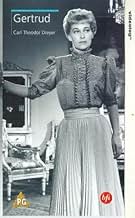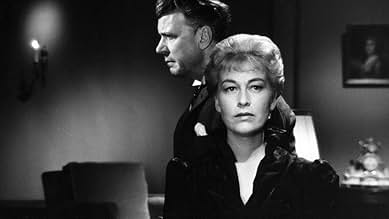In the elegant world of artists and musicians, Gertrud ends her marriage to Gustav and takes a lover, the composer Erland Jansson.In the elegant world of artists and musicians, Gertrud ends her marriage to Gustav and takes a lover, the composer Erland Jansson.In the elegant world of artists and musicians, Gertrud ends her marriage to Gustav and takes a lover, the composer Erland Jansson.
- Awards
- 3 wins & 1 nomination
Edouard Mielche
- The Rector Magnificus
- (as Edouard Mielché)
- Director
- Writers
- All cast & crew
- Production, box office & more at IMDbPro
Storyline
Did you know
- TriviaOne of Lars von Trier's favorite films.
- GoofsWhen Gertrud walks across the room in order to give Axel his letters back, the shadow from the camera and equipment can clearly be seen on the back wall.
- Quotes
Gertrud Kanning: There's no happiness in love. Love is suffering. Love is unhappiness.
- ConnectionsEdited into Eventyret om dansk film 15: Fjernsyn og biografkrise - 1961-1965 (1996)
Featured review
Even by Dreyer's standards "Gertrud" displays a rigidity rare in cinema. When it first appeared critics hated it, (just as they hated "The Searchers" and "Vertigo"). Now, of course, all three films are considered masterpieces but while "Vertigo" and "The Searchers" were commercial films aimed at a mass audience, "Gertrud" was strictly art-house, the kind of film critics were expected to like. It was also Dreyer's last film and it was archetypal Dreyer but this was also the mid-sixties and movies had moved on. We had had a renaissance in France and Italy and Czechoslovakia and even in the UK while America's 'New Wave' was just about to strike. It was a time for young film-makers and Dreyer was an old man. "Gertrud" looked and felt like it could have been made 30 years earlier. Of course, hindsight is a great thing and today "Gertrud" seems more 'modern' than many of the fashionable 'flash-in-the-pan' movies that hit us in the sixties and which now seem like time-capsules from a by-gone age. "Gertrud's" almost somnambulist pace and Dreyer's insistence on long takes, keeping his actors mostly static while allowing his camera to move, however slowly and deliberately, instead now seems almost revolutionary at a time when movies were chiefly about movement and movement in a pell-mell style. While taken from a 1906 play the theme of the film also seems peculiarly modern for the mid-sixties. It's about a woman's liberation from the constraints that men would seek to put upon her, even if that freedom means the sacrifice of romantic love in favour of higher, more intellectual pursuits. At the beginning of the film Gertrud leaves her stuffed-shirt of a husband because he's not prepared to love her unconditionally and attaches herself to a younger man who showers with romantic affection. But his love, too, is a sham and Gertrud is just another of his many conquests, so Gertrud leaves both men, and the poet she truly loved but who put his work above her and has now returned to reclaim her, and settles instead for a solitary but more 'intellectually' satisfying existence. It is a cold movie, it moves at a snail's pace and it is a film of ideas almost devoid of emotion if not feeling, (there is so little happening on screen it often seems like it could just as easily have been done on the radio). The acting is either intensely wooden or deeply cerebral depending on your point of view and since the characters are really only paradigms it is very difficult to engage with any of them. But it is also an incredibly beautiful film, displaying all of Dreyer's visual mastery, (as a 'stylist' Dreyer has always seemed very under-valued), and it's a film that challenges our preconceptions of what a romantic melodrama should be. Even by European art-house standards this is a much more rigorous dissection of the relations between men and women than we are used to. It won't be to everyone's taste but stick with it and you will be richly rewarded with a difficult and a bold film that strives to be a serious work of art and more than succeeds in its aims.
- MOscarbradley
- Mar 31, 2013
- Permalink
- How long is Gertrud?Powered by Alexa
Details
- Release date
- Country of origin
- Official site
- Language
- Also known as
- Гертруда
- Filming locations
- Production company
- See more company credits at IMDbPro
- Runtime1 hour 56 minutes
- Color
- Sound mix
- Aspect ratio
- 1.66 : 1
Contribute to this page
Suggest an edit or add missing content





















